Books
Books
published in 2024

The New Television: Video After Television
Rachel Churner, Rebecca Cleman and 1 more
On the rich history of video art and its enduring relevance to today's artistic and critical practices.
The New Television delves into the rich history of video art, reexamining the pivotal Open Circuits conference held at MoMA in 1974 and exploring its enduring relevance to today's artistic and critical practices. Open Circuits was an important event in establishing video art in American museums and articulated a range of conflicting teloses for the medium, some which materialized (like local cable television) and others that remain unrealized. The conference proceedings were published in 1977 as The New Television: A Public/Private Art, and the radical design of the book reflected the conference's utopian aims.
This two-part publication includes a facsimile of the long-out-of-print conference proceedings and new essays and discussions by over a dozen scholars and artists. The new scholarly texts and previously unpublished archival documents in The New Television illuminate the network of institutional histories of video art, consider global televisual contexts and alternative critical approaches, and examine contemporary video art and its continued relevance from new perspectives.
Rachel Churner is the director of the Carolee Schneemann Foundation. She is also an art critic and editor, whose writings have appeared in Artforum and October magazine, among other publications. She was a recipient of the 2018 Creative Capital/Andy Warhol Foundation Arts Writers Grant and is the editor of multiple books, including Jacqueline Humphries: jHΩ1:) (2022); Yvonne Rainer: Revisions (no place press, 2020), Hans Haacke (MIT Press, 2015), and two volumes of writings by film historian Annette Michelson (MIT Press, 2017 and 2020). Churner is a faculty member at Eugene Lang College at The New School, New York.
Rebecca Cleman is Executive Director of Electronic Arts Intermix (EAI) and a writer. She has programmed screenings and special projects for such venues as the International House Philadelphia; the Museum of Art and Design, Anthology Film Archives, and Andrea Rosen Gallery, New York City; and the Julia Stoschek Collection, Germany; and organized or co-organized many events for EAI, including a panel discussion on the films of David Wojnarowicz and a conversation between Hilton Als and The Wooster Group's director and co-founder Elizabeth LeCompte.
Tyler Maxin is curator at Blank Forms. He was previously the Communications and Special Projects Associate at Electronic Arts Intermix (EAI). His writing has appeared in publications including Artforum, BOMB, and Film Comment.
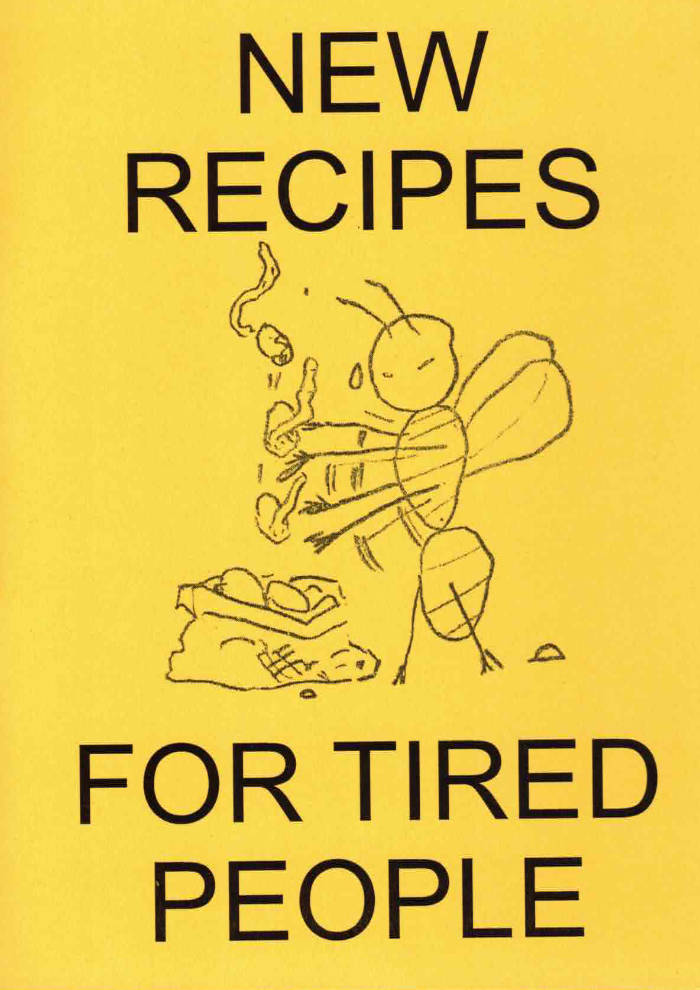
New Recipes For Tired People
Monika Janulevičiūtė, Noah Brehmer
“New Recipes For Tired People” is the first volume of a cookbook series, organized by Monika Janulevičiūtė and Noah Brehmer. This booklet contains 10 tried and tested meal and snack ideas that are easy to shop for, unpretentious to prepare, and simple to customize for people tired and bored of their go-to comfort food. The first edition was produced as a quick print experiment during Publication Studio Vilnius Workshop.
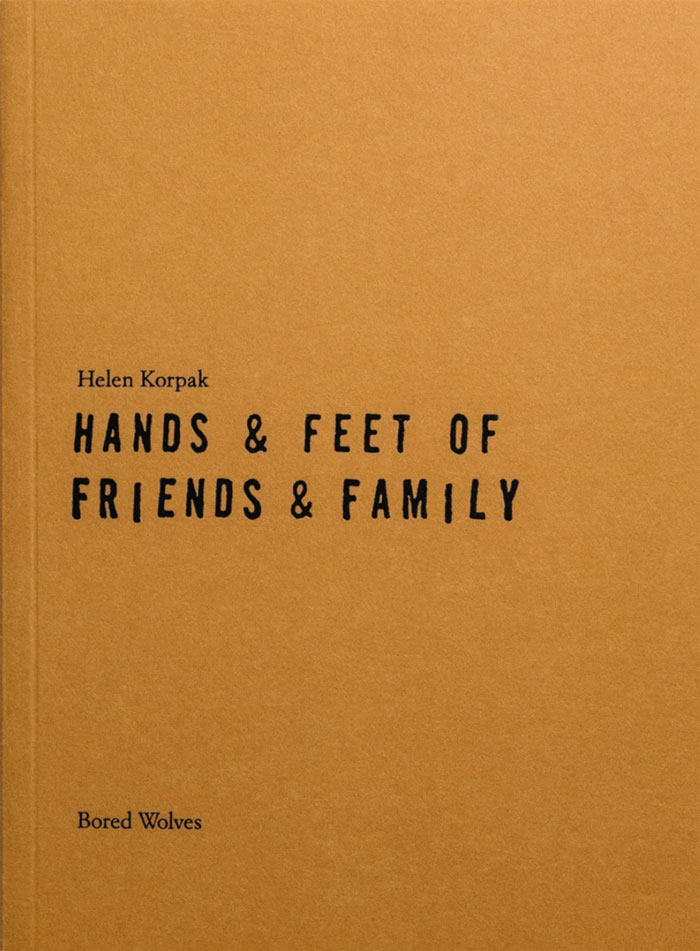
Hands & Feet of Friends & Family
Hands & Feet of Friends & Family is a weave of Helen Korpak’s photocollages and locket-sized literary captions recording closely observed familiar and familial gestures. Granular renderings tenderly taped, Korpak’s collages meld the touching and the wryly humorous, balancing throughout the vulnerability of artist and subjects bonded by essential fondness.
Beginning to look
I started to notice
the older I get
the more I notice
studying the reproductions
separating this from that
noticing the gestures
feeling the movements
of the joints—
Designed and typeset with haptic craft by Samuli Saarinen.
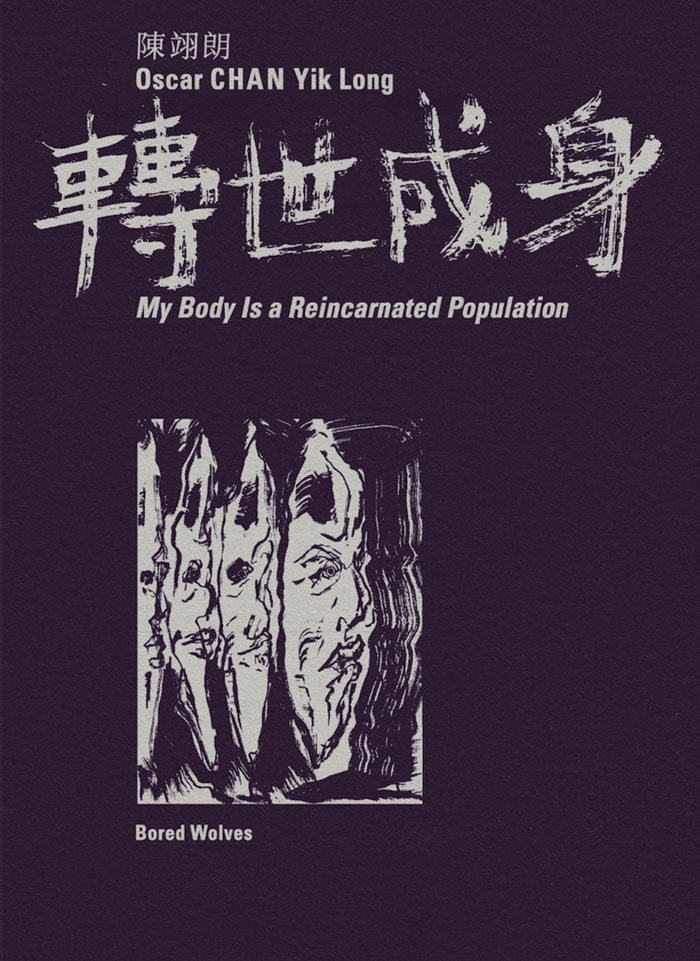
My Body Is a Reincarnated Population
Heart. Compass, radar detector. Lost and anxious. Parents divorce. Respect the rhythm. Fallen angels, now my stomach is all butterflies.
In his artist’s book My Body Is a Reincarnated Population, Helsinki-based Hong Kong artist Oscar CHAN Yik Long (Melted Stars) embraces the pantheon of reincarnated souls embedded within him through ink-and-wash paintings and distilled capsule texts.
His process was guided by the rolls of a die used to connect individuals he has known and encountered in past lives—parents and siblings, relatives and ancestors, friends and enemies, lovers—to his present-life body. Who formed his throat? Who grew into his tongue? Who paired as lungs? Who became skin, muscle, bone, or blood?
The artist’s efforts were ultimately about a form of spiritual atonement in pursuit of physiological harmony for a body facing numerous afflictions: “Through my artwork, I wanted to let the people within me know that, regardless of the tragedies or conflicts that divided us in the past, I have come to terms with everything that happened between us. I sincerely apologize, I express gratitude, I forgive and send love.”

Nawar's Sketchbook
I am not deep, although my eyes are, like a black sea that has been forgotten, as many have told me.
Noura Alsouma’s zine “Nawar’s Sketchbook” is a liquid lament by the Berlin-based Syrian visual artist and printmaker, riveted to eyes that see and therefore shed tears, channeling the heartfelt exposure of the sketchbooks Noura fills to the bleed.
With a moving text by the artist in the original Arabic, reproduced in her handwriting, as well as in English translation by Suja Sawafta.
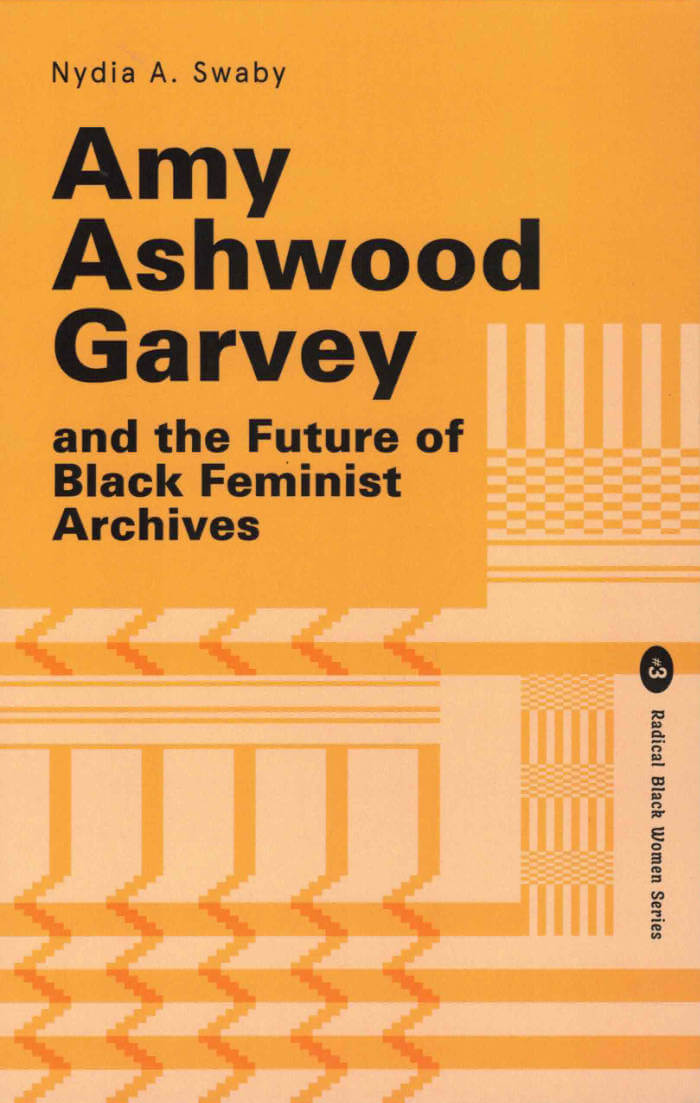
Amy Ashwood Garvey and the Future of Black Feminist Archives
This book charts the journey of Black feminist, artist, researcher and curator Nydia A Swaby as she pieces together a biography of Pan-Africanist and feminist Amy Ashwood Garvey from her scattered archive. In turn, it offers a reflection on the future of Black feminist archival practice.
Often referred to as the first wife of Marcus Garvey, Amy Ashwood Garvey’s contributions to movements for social justice, and in particular Black women’s rights, have largely been forgotten, not least since archives about her life and work are spread across the various places she lived.
After helping Marcus Garvey set up the UNIA, one of the most influential Pan-African movements in the world, Amy moved to New York, where she thrived in the Harlem Renaissance. In the 1930s she emigrated to Britain, where she set up a boarding house and social centre called the Afro People’s Centre, and a club called the Florence Mills Social Parlour. Swaby recovers Amy’s life and work as an important political activist, cultural producer and Pan-Africanist in her own right, retracing her steps across the Caribbean, US, Britain and West Africa.
In addition to conducting traditional archival research, Swaby creates a series of ‘curatorial fabulations’, imagining into the gaps in the archive with her autoethnographic practice. Drawing on the work of contemporary Black feminist researchers, archivists, curators and artists, and her own creative practice, Swaby animates the process of creating and curating Ashwood Garvey’s archive. In doing so, she reflects on the practice of Black feminist archiving past, present and future.
This is the third book in LW’s Radical Black Women Series. It will be essential reading for scholars and students of Black feminism, Pan-Africanism, Black British history, Black arts and archival practice. Endorsements forthcoming from leading scholars in the field including Carole Boyce Davies, Ego Ahaiwe Sowinski, Kelly Foster, Kesewa John and Lola Olufemi.
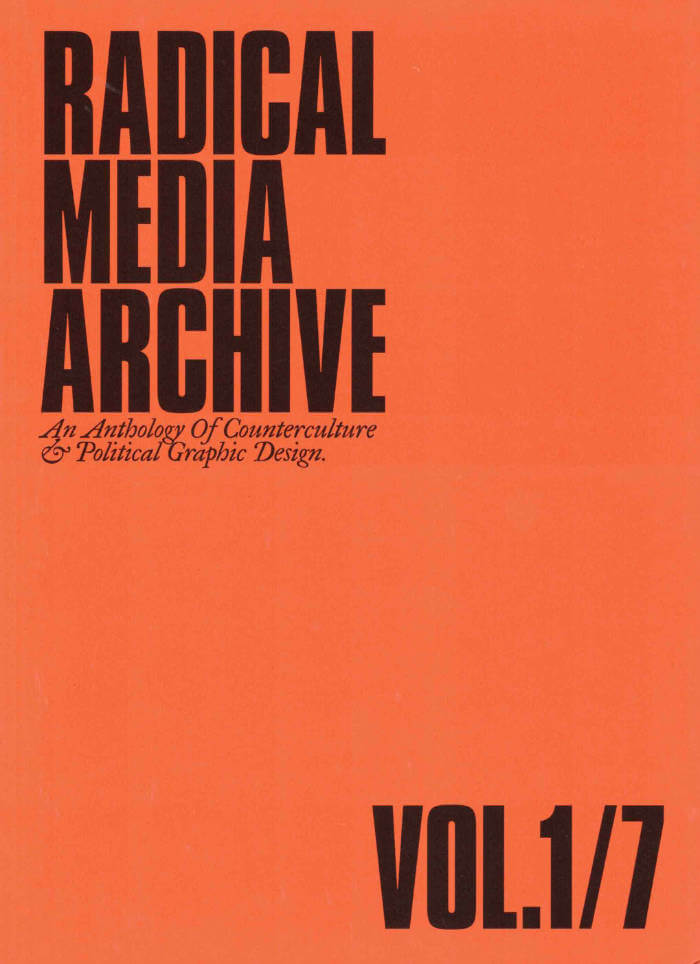
Radical Media Archive Vol 01
Ramdane Touhami, Émile Shahidi
Do you remember the last time you were looking forward to the future? We're not talking about flying cars or floating screens. We're talking about a credible vision of a better time to come. So when was the last time? How did it look? How did it feel?
Have a glance at page 223, about two-thirds in. This is a portrait of Frantz Fanon by Milton Glaser. One of the biggest names in commercial graphic design of the 20th century, painting the likeness of the giant of anti-colonial thought. Let’s leave aside the question of "who's the Milton Glaser of today?" for now, but if there was one, whose portrait would they be painting?
What we’re attempting, in these few hundred pages, is to track our favorite examples of the visual language of revolt and solidarity in the 1960s and 1970s, put them in dialogue with our most beloved works of graphic design of those decades, and celebrate the heroes who made them.
Creative currents flowing from Paris to Tokyo, Cuba to Milano, Beirut to New York, Berkeley to London, with innovations and revolutions (both political and artistic) happening every year. Causes supported by incredible talent and inspiring design that activated people, uplifted liberation movements, advanced the struggles for social justice, and created bonds of global solidarity.
Sadly this cross-pollination between commercial art and the political ended around the late 1980s and those two worlds are now completely isolated from one another.
Why do movements not produce beautiful and memorable visuals anymore? Why do the biggest image makers of today not lend their talents to the good fights that need their help? We hope that these will intersect again, and the first step is to study their history.Friends, we are here to tell you that fighting for a better world is, in fact, not only extremely cool, but the coolest thing you can do — and we have the images to prove it!
Ramdane Touhami and Émile Shahidi have spent years researching and traveling to assemble a huge collection of books, rare periodicals and radical art that will soon be available for consultation in person and online, and of which this little book is just a taste.
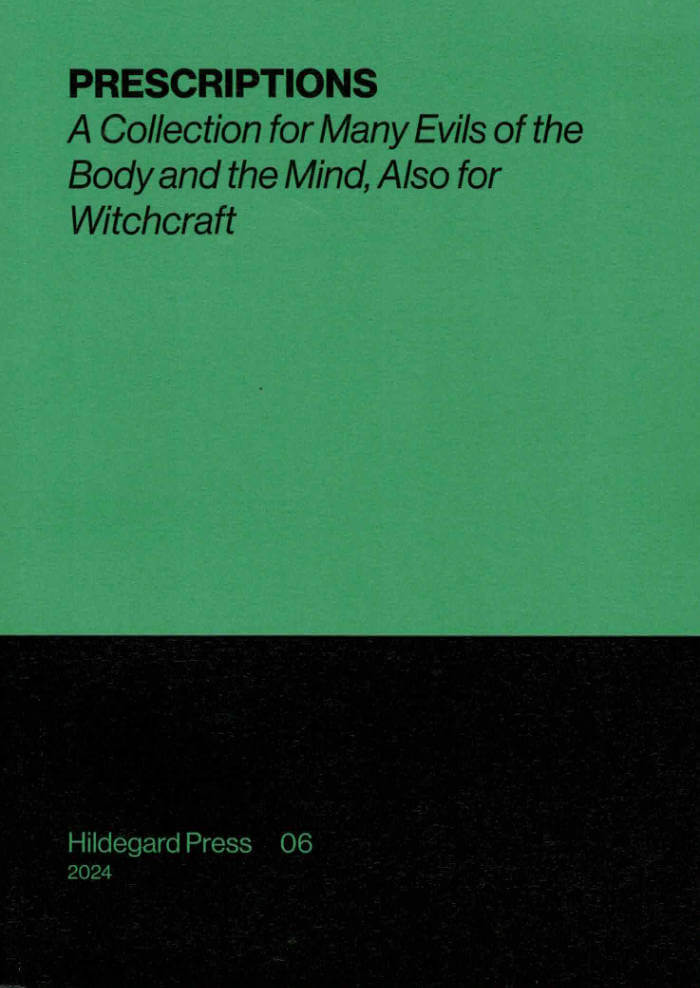
PRESCRIPTIONS: A Collection for Many Evils of the Body and the Mind, Also for Witchcraft
PRESCRIPTIONS is a transcription of a handwritten manuscript, dated to approximately 1650, containing a wide range of medicinal and magical remedies. Currently housed in the Cornell University Witchcraft Collection, it is assumed this practical handbook was a reference for healing, midwifery, and other medical/magical advice. Recipes and instruction cover various methods of purging, ointments for swellings, fevers, and pain reduction, lotions for venereal disease, advice for childbirth, and dilemmas such as “worms in the ear.” Accompanying these medicinal prescriptions are a series of magical prescriptions: charms, rituals, and spells recorded to fortify the ailing body, induce amorous desire, or seek revenge.
With its mix of Latin words, Early Modern English parlance, colloquial plant names, apothecary weights, and archaic medical terms, the recipes can at first appear opaque, but with sustained engagement one can begin to decipher the logics and structures within the writer(s)' shorthand. The original manuscript, in having its own detailed glossary, index, and citations, exhibits a meticulous cataloging of knowledge and resources, and reveals an earnest desire to hold onto the integrity and sanctity of the body in the face of 'many evils.'
The transcription is accompanied by a glossary of terms, an explanation of the various apothecary measurements used, and expanded citations of the medicinal/magical treatises that were abbreviated within the original text.

stewarding
stewarding maps the joyful and embodied ways we can resist oppressive structures that control our food, housing, and socialisation. We begin in an abandoned school, previously the union headquarters for a coal board, which became a legal guardianship, now condemned. We witness acts of communing between human inhabitants, composting worms, microbes in fermentation, and learn working class histories along the way. Here, complex networks emerge between agents, and thrive, disrupting the monolithic power of corporate extraction. Sean Roy Parker’s debut collection of poetry is a generous account of hopeful ways to eat and ways to live.
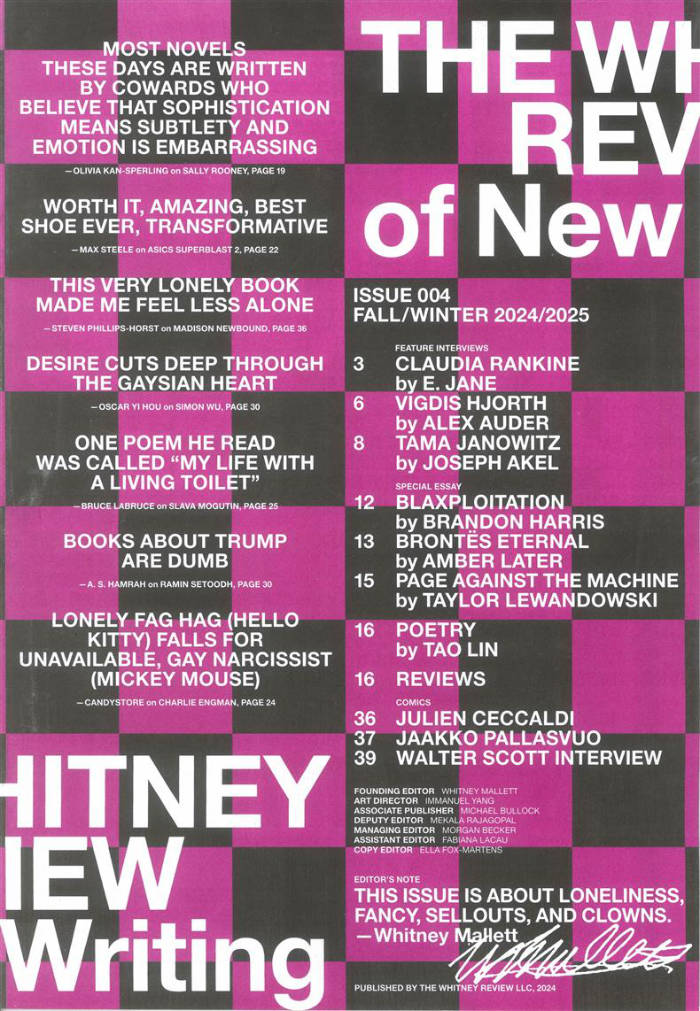
The Whitney Review Issue 4
Interviews with Claudia Rankine, Vigdis Hjorth, Tama Janowitz, and Walter K. Scott. Essays on Blaxploitation, the Brontë sisters, and Kevin Killian's Amazon reviews. Plus comics, poetry, and The Whitney Review's signature chorus of short-format reviews.
Contributors include A. S. Hamrah, E. Jane, Bruce LaBruce, Oscar yi Hou, Alex Auder, Olivia Kan-Sperling, Tao Lin, Amber Later, Brad Phillips, Brandon Harris, Nicolaia Rips, Julien Ceccaldi, Linda Simpson, Michael Bullock, Jaakko Pallasvuo, Geoffrey Mak, Joseph Akel, Candystore, Taylor Lewandowski, Max Battle, and many more.
Abolish Rent, fag/hag, Dear Dickhead, Tweakerworld, and Napalm in the Heart are among the books reviewed. Steven Phillips-Horst skewers c* ns* r*d instagram captions. Max Steele asks can masochism be gentrified? Published biannually, The Whitney Review of New Writing is a bold expansion of literary criticism. The fourth issue is about clowns, sell-outs, loneliness, and fancy.

Elke dag is een tentoonstelling
Special edition: 100 out of 300 books are reworked by making cutouts in the book.
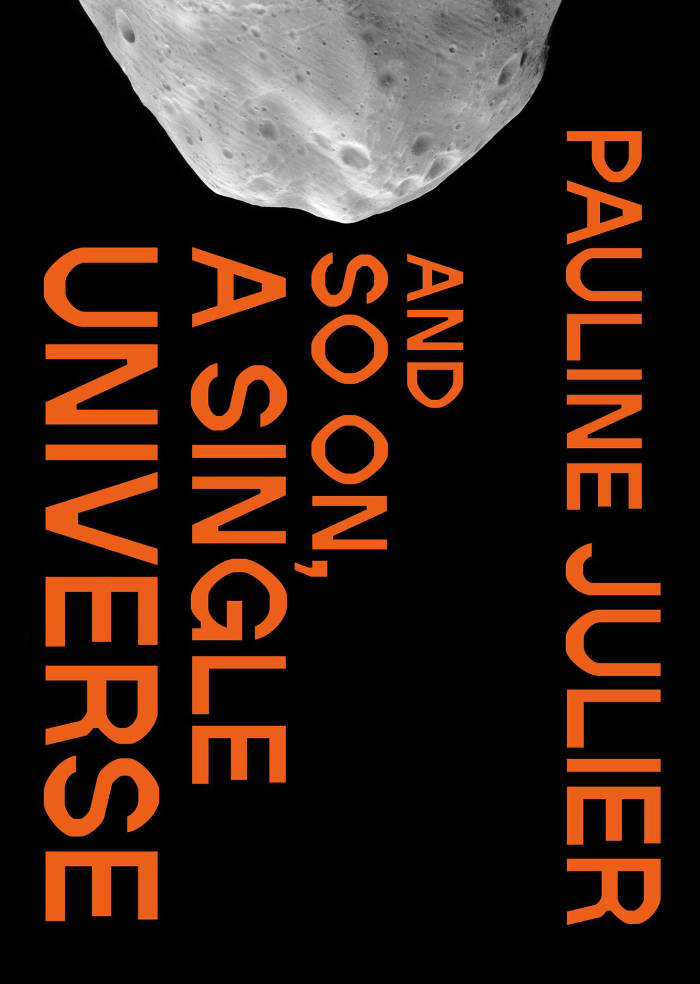
And so on, a single universe
A collection of Pauline Julier’s art that expands from the terrestrial to the cosmos to comment on our place in the universe.
At the interface of documentary and fiction, the multimedia works collected in Pauline Julier take us on a dizzying journey through space and time. Julier’s art travels through the geological ages of planet Earth, through different histories, natural disasters, and the Anthropocene’s paradigm shifts and into outer space. Her background in political science and photography is reflected in her work: looking into the past and the future, she investigates topical questions about our unlimited use of natural resources, escapism, and the colonization of space.
Conceived and designed as a work of art in its own right, this volume offers a comprehensive insight into Julier’s art and thought through a conversation with eminent scholar of science and technology studies Donna Haraway alongside contributions by curator Céline Eidenbenz, anthropologist, and writer Nastassja Martin, and art historian, curator, and author Chus Martínez.
Edited by Céline Eidenbenz and Sarah Mühlebach.
With Contributions by Donna Haraway, Pauline Julier, Nastassja Martin, and Chus Martínez.
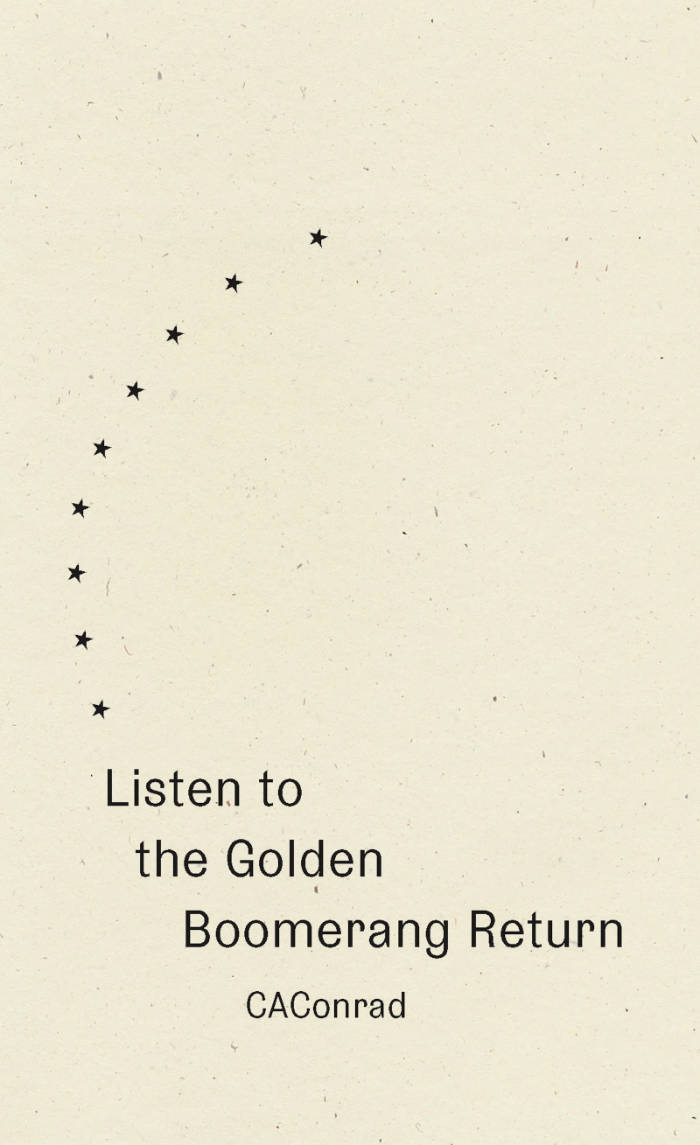
Listen to the Golden Boomerang Return
Following their book AMANDA PARADISE: Resurrect Extinct Vibration (winner of the PEN and the Ruth Lilly Prize for Poetry), CAConrad's Listen to the Golden Boomerang Return shifts its attention from the previous book’s focus on communing with animals who are extinct toward communicating and caring for animals still living among us.
Recalling the historical and symbolic significance of the boomerang as an instrument of return, these poems emerged from a (soma)tic poetry ritual in which the author wrote with animals who have found ways to thrive in the Anthropocene, resulting in sculptural poems that are uninhibited and mysterious as they emerge organically from the bottom of each page. Guided by the urge “to/desire/the world/as it is/not as/it was,” CAConrad writes from an ecopoetics that is generous and galvanizing, reminding us of how our present attentions collectively shape a future humanity.
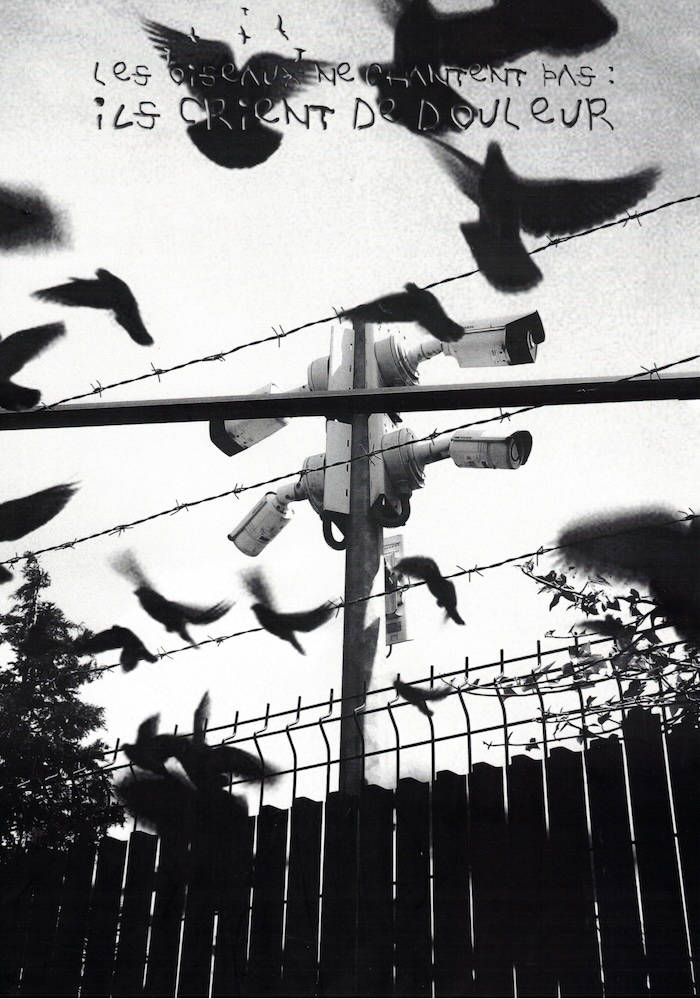
Miam 09 : Les oiseaux ne chantent pas : ils crient de douleur
4SPIKE & howawfulallanis, Alex Less, Alice Royer, Alligataure, Amelie Clicquot, Anjol, Arañada, Axel Fievet , Axelle Bourguignon, Baron & Tosma, Charlie Cooper, Charlotte Sallan Gémard, Délora Abbal, Elliott Sanchez, Erimoczi, femo, Fleur Douglas, Gaia Bergelin & Inès Camrla, Justine Bouvet, Kara, Kiara Patry, Lilian Magardeau & Elisa Grondin, Loreleï, Lucile Moreau, Manon Souza, Marie Martin Design, Mira, Migraine, Nathan Peron, Nathanael Brelin, Nomaison, Ema Tomas, Othilie Jourde Ledoux, Piquico , Rémy Bellariva, Séraphin Degroote Ferrera et Arthur Diguet, Syan Fischer, Tanikawa Sari, Vanessa Kintzel, Virginie Contier, Viviane Le Borgne, Zoé Vincent.
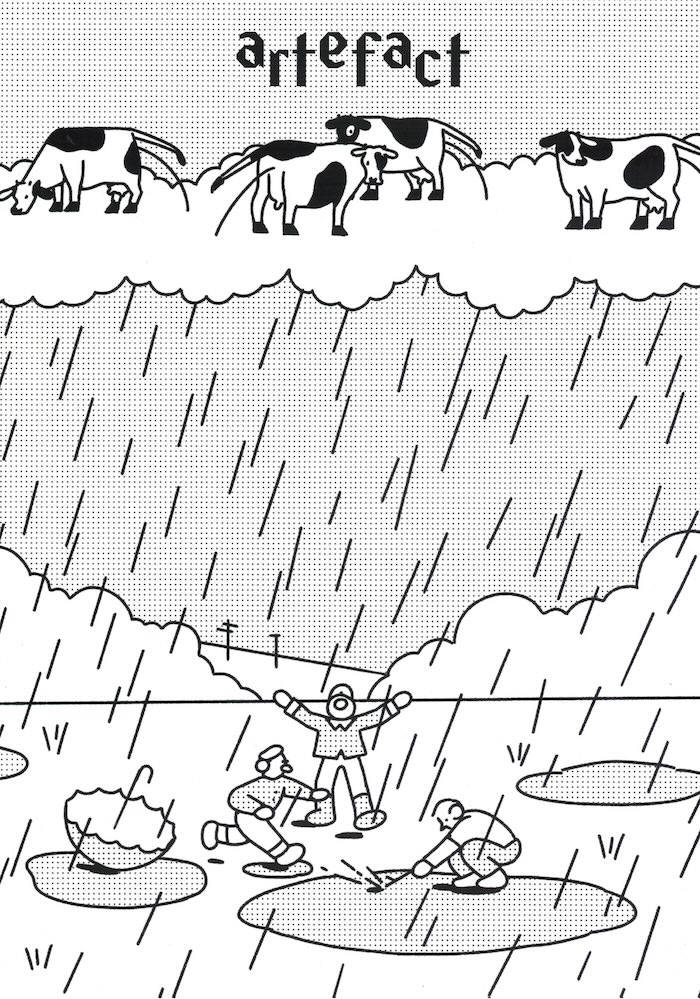
Miam 08 : Artefact
"Cet ouvrage est un magazine participatif regroupant les oeuvres de 48 artistes autour d'un thème commun, l'artefact. Vertige du passé ou projection contemporaine, l'artefact nous parle. Il raconte les cultures, en façonne le souvenir et promet ainsi un voyage à travers les créations humaines. Ce sont ces témoignages tangibles de l'existence que nous souhaitons vous offrir grâce aux interprétations captivantes de l'artefact. Chaque page de ce nouveau numéro est une invitation à plonger dans les méandres de l'histoire ou de la fiction, à explorer les différentes strates de l'humanité à travers le primes de ses réalisations matérielles."
Alexandre Daram, Alice Royer, Audrey Poujoula, Audrey Ramos, Basile, Bordel j’ai glissé, Cel, Charlie Udave, Collectif IPN, Elliott Sanchez, Emilia Pesty, Marie Derrien, Fils Kurylak, Flora Rushiti, Hélène Berlemon, Inès Day, Julie Plantefeve, Kaspar kaspar.wtf, Kawani DS, Kiara Patry, Laura Zanti, Lauriane Rolo, Le Bayou Club Graphique, Lea Canovas, Lili Archer, Lily Terrible, Lisa Dehove, Lola Marty, Louis Kervel, Lutine Cabarrou, Maeva Iorio, Maké, Martin Régnier, Maxoy, Meuneurol, Nathanael Brelin, Nurzen & Jack Montaly, Oscar, Pierre Touron, Ptit Lylou, Rachel Roland, Rose Meybeck, Sarah Josserand, Theo Grandchamp.

Gay Girl Prayers
A collection of poetry reclaiming Catholic prayers and biblical passages to empower girls, women, and members of the LGBTQIA+ community.
The extreme level of sass in Emily Austin’s Gay Girl Prayers does not mean that this collection is irreverent. On the contrary, in rewriting Bible verses to affirm and uplift queer, feminist, and trans realities, Austin invites readers into a giddy celebration of difference and a tender appreciation for the lives and perspectives of “strange women.”
Packed with zingy one liners, sexual innuendo, self-respect, U-Hauling, and painfully earnest declarations of love, this is gayness at its best, harnessed to a higher purpose and ready to fight the powers that be.
"Gay Girl Prayers offers a template for queer resistance to religious doctrine in revised Bible verses. Emily Austin has forged an unholy hymnal, a book of praise songs that shuck off stuffy Christian constraints to embrace instead unrepentant joy. She redefines Heaven not as a place for the puritanical, but rather a series of intimate moments between queer girls ‘who take lamps to one another’s bed chambers' and reimagines, through erotic apocrypha, divinity inclusive of ‘the curious… the closeted… the butches… the femmes… bisexuals, pansexuals… all queer trans people.’ Gay Girl Prayers is a renunciation of orthodoxy, a proclamation of queer solidarity, and a celebration of self-love."
—Evelyn Berry, author of Grief Slut and Buggery
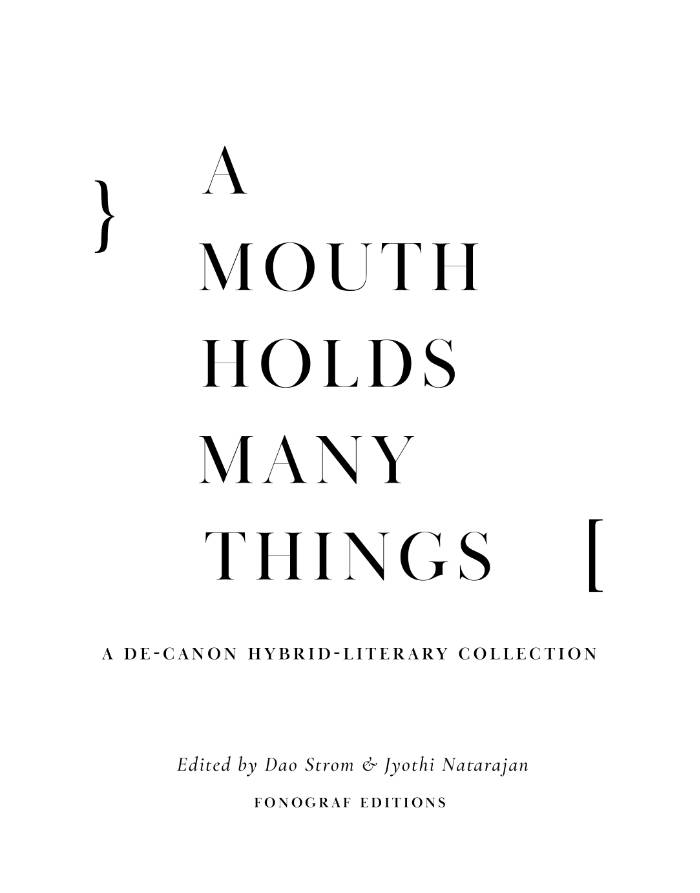
A Mouth Holds Many Things: A De-Canon Hybrid Literary Anthology
A Mouth Holds Many Things collects hybrid-literary works from 36 women and nonbinary BIPOC writer-artists. Spanning experimental poetry and prose, image-text, collage, performance text, AI-generated writing, and more, this ground-breaking full-color print volume illuminates and expands the interstitial spaces where text blends, blurs, and morphs with visual and other media.
At the restless heart of this collection is a challenge to some fundamental questions: What is reading? What is writing? Lifting language beyond the domain of the letter, the works collected here present language in other forms: visual, embodied, sonic, asemic, tactile. Language, after all, is multi-textu(r)al, interwoven, punctured, fragmented, grafted, possessing power to construct and deconstruct, fed into by many rivers of experience: marginalizations and migrations, diasporas and displacements, invisibilities and hyper-visibilities.
A project of the Portland-based literary-social art project, De-Canon, which creates unique spaces and experiments to center works by writers of color, this collection is edited by Dao Strom and Jyothi Natarajan.
A Mouth Holds Many Things was, in the short stories/poetry/anthologies category, the winner of a 2024 PubWest Book Design Award.
Full list of contributors
Stephanie Adams-Santos, Kimberly Alidio, Samiya Bashir, Aya Bram, Victoria Chang, Jennifer S. Cheng, Gabrielle Civil, desveladas (Macarena Hernández, Sheila Maldonado, Nelly Rosario), Carolina Ebeid, Nadia Haji Omar, Christine Shan Shan Hou, Imani Elizabeth Jackson, Vi Khi Nao, Diana Khoi Nguyen, Quyên Nguyễn-Hoàng, Cindy Juyoung Ok, Monica Ong, Shin Yu Pai, Jenne Hsien Patrick, Jennifer Perrine, Alley Pezanoski-Browne, Kelly Puig, Ayesha Raees, Jhani Randhawa, Paisley Rekdal, Daisuke Shen, Sasha Stiles, Sandy Tanaka, Arianne True, Addie Tsai, Vauhini Vara, Divya Victor, Anna Martine Whitehead, Kathy Wu
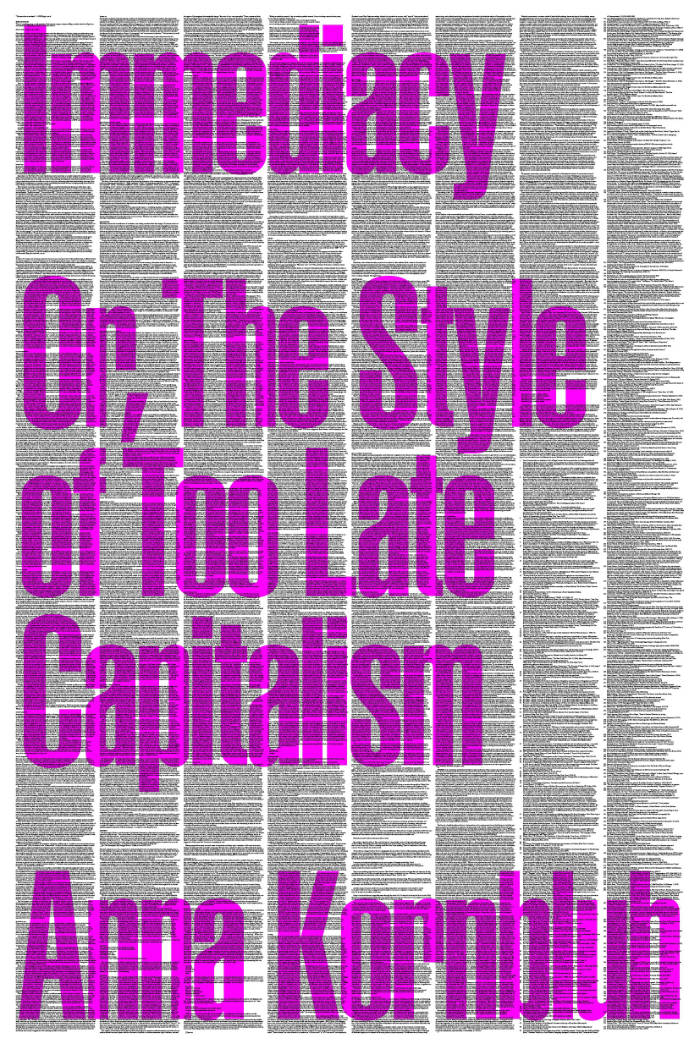
Immediacy: Or, the Style of Too Late Capitalism
Why speed, flow, and direct expression now dominate cultural style.
Contemporary cultural style boosts transparency and instantaneity. These are values absorbed from our current economic conditions of "disintermediation": cutting out the middleman. Like Uber, but for art. Immediacy names this style to make sense of what we lose when the contradictions of twenty-first-century capitalism demand that aesthetics negate mediation. Surging realness as an aesthetic program synchs with the economic imperative to intensify circulation when production stagnates. "Flow" is the ultimate twenty-first-century buzzword, but speedy circulation grinds art down to the nub. And the bad news is that political turmoil and social challenges require more mediation. Collective will, inspiring ideas, and deliberate construction are the only way out, but our dominant style forgoes them.
Considering original streaming TV, popular literature, artworld trends, and academic theories, Immediacy explains the recent obsession with immersion and today's intolerance of representation, and points to alternative forms in photography, TV, novels, and constructive theory that prioritize distance, impersonality, and big ideas instead.
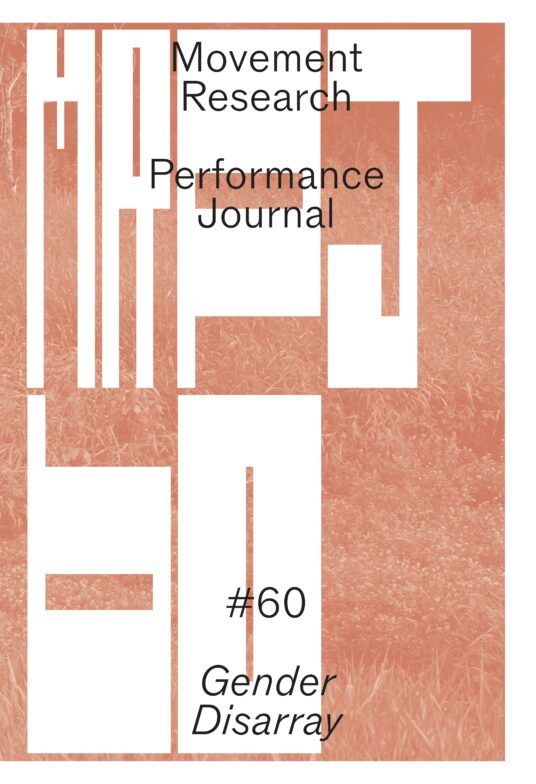
Movement Research Performance Journal
Issue #60 - Gender Disarray
Kay Gabriel, Amalle Dublon and 2 more
Under the direction of four contributing editors—Amalle Dublon, Kay Gabriel, Keioui Keijaun Thomas, and Anh Vo— we’ve assembled a new body of work by mostly trans and queer artists reflecting on the keyword “gender” and its relation to contemporary performance. Their work moves across multiple genres of writing, from analytic essays to poetry to performance scripts.
“Read My Lips” is a phrase that will be familiar to longtime readers of the Movement Research Performance Journal—so familiar that the mere reference will bring to mind an image posted by the artist collective GANG, an image that lies at the heart of one of the journal’s most spectacular moments. Issue #3, with its focus “Gender Performance,” was published in 1991 amid that era’s Culture Wars, receiving almost immediately negative reception from government officials (the NEA threatened to withdraw funding from Movement Research) and many members of the dance community (who considered Issue #3 to be deliberately provoking the so-called “war,” intentionally taking a political position that some worried might comprise future funding of the field). In the thirty-three years since its publication, Issue #3 has developed a patina familiar to many artist-activist histories that are looked upon with romance and nostalgia, often by those for whom that history is only a fantasy (rather than a lived experience).

Disavowal
This book argues that the psychoanalytic concept of disavowal best renders the structure underlying our contemporary social response to traumatic and disturbing events, from climate change to unsettling tectonic shifts in our social tissue. Unlike denialism and negation, disavowal functions by fully acknowledging what we disavow. Zupancic contends that disavowal, which sustains some belief by means of ardently proclaiming the knowledge of the opposite, is becoming a predominant feature of our social and political life. She also shows how the libidinal economy of disavowal is a key element of capitalist economy.
The concept of fetishistic disavowal already exposes the objectified side of the mechanism of the disavowal, which follows the general formula: I know well, but all the same, the object-fetish allows me to disregard this knowledge. Zupancic adds another twist by showing how, in the prevailing structure of disavowal today, the mere act of declaring that we know becomes itself an object-fetish by which we intercept the reality of that very knowledge. This perverse deployment of knowledge deprives it of any reality.
This structure of disavowal can be found not only in the more extreme and dramatic cases of conspiracy theories and re-emerging magical thinking, but even more so in the supposedly sober continuation of business as usual, combined with the call to adapt to the new reality. To disrupt this social embedding of disavowal, it is not enough to change the way we think: things need to change, and hence the way they think for us.

Bad Girls
Gritty and unflinching, yet also tender, fantastical, and funny, a trans woman’s coming-of-age tale about finding a community among fellow outcasts.
Born in the small Argentine town of Mina Clavero, Camila is designated male but begins to identify from an early age as a girl. She is well aware that she’s different from other children and reacts to her oppressive, poverty-stricken home life, with a cowed mother and abusive, alcoholic father, by acting out—with swift consequences. Deeply intelligent, she eventually leaves for the city to attend university, slipping into prostitution to make ends meet. And in Sarmiento Park, in the heart of Córdoba, she discovers the strange, wonderful world of the trans sex workers who dwell there.
Taken under the wing of Auntie Encarna, the 178-year-old eternal whose house shelters this unconventional extended family, Camila becomes a part of their stories—of a Headless Man who fled his country’s wars, a mute young woman who transforms into a bird, an abandoned baby boy who brings a twinkle to your eye.
Camila Sosa Villada’s extraordinary first novel is a rich, nuanced portrait of a marginalized community: their romantic relationships, friendships and squabbles, difficulties at work, aspirations and disappointments. It bears witness to these lives constantly haunted by the specter of death—by disease or more violent means at the hands of customers, boyfriends, or the police—yet full of passion, empathy, and insight.

Par-delà étrange et familier
Dans cet ouvrage, malheureusement son dernier, Mark Fisher revisite des artefacts culturels familiers afin de cartographier les variétés de l’étrange dont ils sont porteurs. Longtemps sensible aux dimensions bizarre et omineuse qu’il devinait, sans les nommer, entre autres dans les œuvres de Lovecraft, les films de David Lynch ou les albums de The Fall, M. Fisher tente ici la synthèse essentielle d’un questionnement qui l’avait hanté, jusqu’à ce livre.
Avec son regard si particulier, celui du critique culturel tout à la fois pop et moderniste, puisant aux sources de la psychanalyse et du marxisme, Fisher se penche sur des objets sensibles pour y saisir les rapports entre présence et absence, entre ce qui devrait être mais n’est pas, ce qui ne devrait pas se présenter mais survient. C’est en compagnie de ces spectres — du titre d’un autre ouvrage — que nous sommes invités à voyager, pour questionner les formes mêmes de nos existences sociales, jusqu’aux frontières de l’étrange.

Tee A. Corinne: A forest fire between us
Tee A. Corinne, Charlotte Flint
A forest fire between us is an ambitious publication that uncovers Tee A. Corinne’s radical and expansive photographic practice, offering a new perspective on the intersections of her work as photographer, lesbian sex activist, educator, and author. Edited by curator Charlotte Flint, this book charts a route through Corinne’s practice with never-before-seen photographs, slides, contact sheets, and ephemera uncovered from her archive. Showcasing the pioneering work that established Corinne as one of the foremost lesbian photographers of her time, this publication places Corinne alongside friends, fellow artists, writers, and activists who helped define radical counterculture, from Audre Lorde to Joan E. Biren (JEB), Ruth Mountaingrove to Honey Lee Cottrell, among others.
At the book’s heart are the Feminist Photography Ovulars, gatherings of women in the Oregon countryside which were the setting for DIY photographic workshops exploring image-making against the natural landscape, which Corinne co-organized in the late 1970s and early 1980s. The photographs made during these annual gatherings speak to the incredible community that Corinne fostered, and an understanding of the ways in which play and pleasure can come together to create something radical.
Delving into an extensive array of archival material, A forest fire between us is a call to action that shows us the ways in which photography, activism, and community can come together to create a powerful new visual language around desire.
With an extensive chronology and texts by Ruth Mountaingrove, JEB, and Charlotte Flint.

Hello Chaos, a Love Story
Kitty, the cute and mute cartoon protagonist of Hello Chaos, a Love Story: The Disorder of Seeing and Being Seen, embarks on an ill-fated endeavour to win the eyes of her estranged counterpart Mickey in this genre-defying book by Charlie Engman. Through a cat-and-mouse narrative of unrequited attention-seeking, Engman unravels the contradictions of contemporary visual culture as Kitty and Mickey struggle to find each other and themselves amidst the chaos of imagery, technology, and mass production. Extensively illustrated with a wide range of images both original and found, this book attempts to tackle the beautiful, horny, horrible vulnerability of looking and being perceived.